Transfer Story from Riga: Finding new forms for stronger cooperation with Riga`s NGOs or Riga`s NGO House “expands beyond its walls”
Edited on
14 December 2020“The Riga NGO House is an excellent place for non-governmental organisations to gather, and yet, how could we – the residents of other neighbourhoods of Riga – use all of its services?” The question came from an energetic representative of an NGO, who lives and works in Pārdaugava, across the Daugava River, during a seminar at the NGO House. She went on explaining: “This is the only House of this kind in Riga, and we also want to organise events in our neighbourhoods, closer to our places of residence, we want to engage in the activities held by the participants of the NGO House. Can we organise jointly a networking event in our neighbourhood?” Such questions are more frequently heard at the NGO House, sometimes outlining a particular direction of development that the NGO House should take – to spread its wings in other neighbourhoods of Riga.
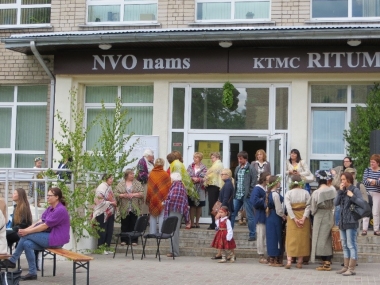
Can a good practice – the Riga NGO House – be made even better?
Yes, in Riga, the capital city of Latvia, the NGO House has been open already for 6 years – the space of collaboration and support for non-governmental organisations, the place, where representatives of organisations can meet, engage in activities, learn, explore and create. We can state with pride that the Riga NGO House has been internationally recognised as the good practice example in URBACT programme and assessed as an effective model of cooperation between non-governmental organisations and municipality, which functions successfully and is worth recommending as a model to other cities. The international project “ACTive NGOs”, in which Riga is the leading partner, is dedicated exactly to this – development and improvement of various cooperation models for NGOs and municipalities and sharing the best practice examples among the project partners and other European cities. Nevertheless, the Riga NGO House also has something to learn and to improve.
A new direction outlined: the NGO House’s out-of-house activities
The Riga NGO House, together with NGOs, has succeeded in implementing numerous important events, which have been significant not only for each organisation separately but also for the general public. However, the name and activities of the NGO House predominantly are associated with one particular space – a five-storey high white brick building in one of the neighbourhoods of Riga, 20 minutes ride away from the city centre. However, NGOs are active throughout the territory of Riga and perhaps one day – in near or more distant future – each of the 58 neighbourhoods of Riga will have an NGO House of its own, but in the meanwhile – what can we do? How to reach the NGOs, communities and active residents operating in other neighbourhoods of Riga? What kind of activities and events should be organised beyond the walls of the NGO House? Let’s have an insight into how, thanks to the experience gained in the project and the encouragement by active Rigans and NGOs, new forms of closer and tighter cooperation with NGOs and residents in various neighbourhoods of Riga are sought for and implemented, for organising the activities of the NGO House outside the House. Upon launching the project “ACTive NGOs”, this was the direction that we found uncharted and in need of exploration. On the one hand, our space is limited, on the other hand, we can go beyond it.
Although the NGO House has been recognised as the good practice example, we cannot rest on the laurels, we must keep our eyes and ears open, in particular, as regards the issue we are interested in – how to develop activities outside the NGO House. Our partners in the project “ACTive NGOs” – Siracusa (Italy), Santa Pola (Spain), Dubrovnik (Croatia), Espoo (Finland) and Brighton and Hove (the United Kingdom) are excellent advisors and provide answers to us: the actions organised by NGOs and residents, outings, cultural events, informal discussions with residents over a cup of coffee, campaigns are examples worth taking over to improve the cooperation with Riga’s NGOs and communities of active residents. If partners put their heads together to find ways in their cities to create and find shared spaces for NGOs’ activities and support, developing the idea of an NGO House, we, on the contrary, are searching for and finding ways, how to “go outside” the premises of the NGO House, thus strengthening collaboration with NGOs and promoting awareness of the role and activities of NGOs among residents.
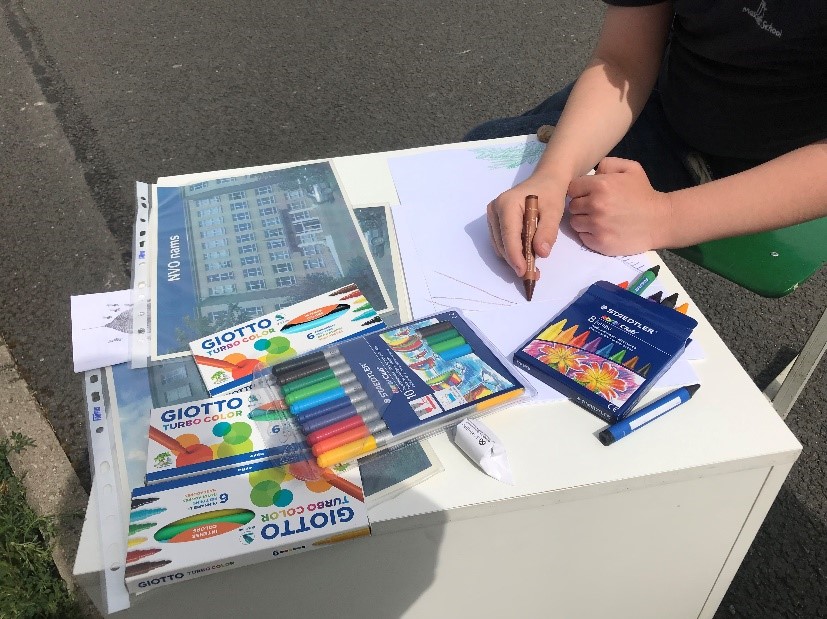
Inspired by Brighton and Hove… with coffee and croissants
Already during the first international seminar of “ACTive NGOs” in Santa Pola, we heard the exciting story by the representatives of Brighton and Hove about discussions with the residents in an informal environment – over a cup of coffee with croissants, jointly working on such an important document as the Neighbourhoods’ Action Plan. Free, unrestrained atmosphere allows the stakeholders to relax and productive dialogue to develop.
Brighton and Hove, by participating in “ACTive NGOs” project, focus on the development of disadvantaged neighbourhoods of the city, emphasising that the municipality has not only a moral obligation but also an economic need to cooperate effectively with these neighbourhoods and shape solutions together with the residents, community groups and organisations of the NGO sector. The municipality of Brighton faces serious challenges in developing a closer partnership with NGOs, among other, insufficient self-confidence of the municipal services in working with NGOs, difficulties that NGOs experience in accessing the responsible municipal services and employees as well as communities’ disappointment in the services provided by the municipality. These challenges have urged the municipality to change its relationships with the players of the civil sector: to involve more local communities, increase the capacity of communities as well as to develop more practical channels of communication with them.
Brighton and Hove aim to transform the public administration, making it more open and ready to respond to communities’ needs. Similar problems emerged also in developing the activities of the Riga NGO House – NGOs with similar goals do not collaborate, some NGOs have low capacity, an effort is required to bring together NGOs, more effective means of communication must be sought, a common language with NGOs needs to be found. Similarly, the municipality of Riga, through various platforms, including the NGO House, is creating long-term cooperation with and support for NGOs, constantly looking for new and more effective ways of gearing.
The municipality of Brighton and Hove uses various paths and ways to reach its residents. One of these – organising outdoor activities. In this area, some models of good practice have appeared, for example, the programme “Active Life”, events of the programme offering possibilities of voluntary work or joint walks taken by the councillors and residents in the neighbourhood to highlight the issues that need to be solved within communities and the necessity of new projects. Interestingly, the municipal community engagement group dedicates its time and participates in all public events organised by the communities and NGOs of the city rather than organises events managed by the municipality, thus reaching various groups of residents and developing mutual trust. The representatives of Brighton admit that often events are successful if organised in partnership with NGOs and community groups, for example, art and culture festival “East Brighton – Our Place” or “Whitehawk Community Day 2019”.
Two examples serve as a very good illustration of the events for resident engagement. “Hawks Community Cafe” has been opened in Brighton and Hove; its motto is “more than a place for eating and quenching thirst”. It is a community café, located in a municipal building, which the local team of activists has transformed into a community centre and a trusted place, where local communities meet informally. “Park Life”, in turn, is a story about a campaign dedicated to establishing a community park, created by the residents for the residents. As the result of this campaign, it has been possible to gather the local residents in parks, organise several events, for example, the Great Picnic.
Representatives of the municipality of Brighton and Hove focus their activities both on premises accessible to the local community and on looking for creative, innovative approaches in their work with the local community, among others – to go beyond the centres of communities. Exploring the experience of the partners from Brighton and Hove and the activities organised in the local communities, as well as examples of events organised outside of municipality venues, in the form of outdoor activities, it becomes clear how to develop the idea of the NGO House beyond the walls of the building. This does not mean that there are no opportunities to approach other neighbourhoods. We can be closer to the residents and communities of Riga`s other neighbourhoods.
Tom Goodridge, community engagement officer of the municipality of Brighton and Hove, when asked, whether it is important to communicate with residents through informal events, responds: “Absolutely – it is key to create a variety of ways, in which residents can communicate and have dialogue with their municipality.”
Riga`s NGO House “expands beyond its walls”
Inspiring, creative examples of working with the local community in Brighton and Hove as well as the ways of engaging communities in informal ways clearly show how we can expand the activities of the NGO House in various neighbourhoods of Riga and use the potential of the NGO House to address and engage residents. Significantly, an appropriate offer followed immediately – the NGO House was invited to co-organise and participate in community festivals. Thus, last year (in 2019), the Riga NGO House for the first time went outside its premises, both literally (outdoors) and also by expanding the perception of the role and activities of the non-governmental sector. Contrary to concerns regarding the interest of non-governmental institutions, they showed great responsiveness and willingness to engage. NGOs were, indeed, happy about the possibility “to move outside the premises”, and the NGO House together with almost 30 non-governmental organisations of Riga participated in a public, informative networking event held in one of the most distant neighbourhoods of Riga – Bolderāja. Bolderāja is situated in the northern part of Riga, on the opposite side of the Daugava River to the NGO House. The main organisers of the festivities were the locals – institutions of education and culture of Bolderāja neighbourhood – Music and Art School, Centre for Children and Youth, 3 secondary schools, Latvian Maritime Academy, and the library. The concept and content of the festivities were developed in close collaboration with these local organisations. The task of the NGO House and the interested NGOs was to add to the total programme of Bolderāja neighbourhood festivities by “filling” one of the “stages”. The challenge was also to find out whether NGOs would be able to provide sufficiently engaging activities and active communication to engage event attendees in the dialogue.
The morning of 1 June 2019 in Bolderāja was sunny and strong wind was blowing as if wishing to help people getting active. Tents were put up one after another in the school stadium allocated for the activities of the NGO House and NGOs. Each of them was immediately populated and arranged. Banners, tables with games, pictures, papers, paints and most diverse objects appeared. Children, happy on the first day of their summer holiday, were running around, chatting and laughing. Art groups, in splendid costumes, were coming to test their voices and dance steps. The bustle in the school stadium gradually and insistently tempted more and more residents of the neighbourhood, passers-by and visitors to Bolderāja.

Throughout the day of Bolderāja neighbourhood festivities, the NGO House and NGOs offered diverse events, where the visitors, adults and children alike, could participate in educational and creative workshops, receive information about the activities of the NGO House, take part in competitions, games, and receive advice on issues of integration. They could also find out about volunteer work, explore possibilities of social assistance, current environmental issues, discuss the values and future of Europe, and gain an insight into the culture of various ethnicities. Every organisation told to the residents and visitors of Bolderāja about their activities, main aims and invited to their events. The informative awning of the NGO House attracted particularly high interest among the visitors – the House’s representatives explained what the activities and events of the NGO House were, told about the possibilities of participation for the residents of the local community, discussed the importance of NGOs. Children had not been forgotten – young artists could draw the NGO House as they imagined it was or what it should be like. Visitors could also explore the exhibition, created jointly by the NGO House and NGOs, “NGOs’ Stories in Latvia’s Centenary”, which collected stories of more than 40 non-governmental organisations about their establishment, values and mission, reflected the most important events and achievements in the life of these organisations that they were proud of. The exhibition both promotes the activities of non-governmental organisations and highlights their significance and role in Latvia in strengthening the civil society, both by looking back into history, examining the present and turning to the future. A concert was held with the participation of artistic groups of various ethnicities, presenting the different and the common aspects in the cultures of ethnicities residing in Riga. Groups, active in non-governmental organisations of culture and ethnic minorities, gave musical, dance, circus and theatre performances, at the same time showing how diverse forms of activities NGOs can engage in. The event was based on the idea of providing an opportunity to present in creative and attractive way to the visitors of the festivities – residents of the neighbourhood belonging to various generations and others – the activities, mission, events of non-governmental organisations, as well as the possibilities of involvement, serve as an inspiration to participate. The festivities, in particular, aimed at promoting collaboration and tolerance among the neighbourhood residents belonging to different generations, providing purposeful joint leisure time activities for families, creating a network for neighbourhood residents and non-governmental organisations of Riga. The event turned into wonderful festivities and a networking event both for the visitors and the NGO House, reinforcing the wish to organise such public and informative events also in the future to promote the NGO House’s work and more extensive engagement of the society in NGOs.
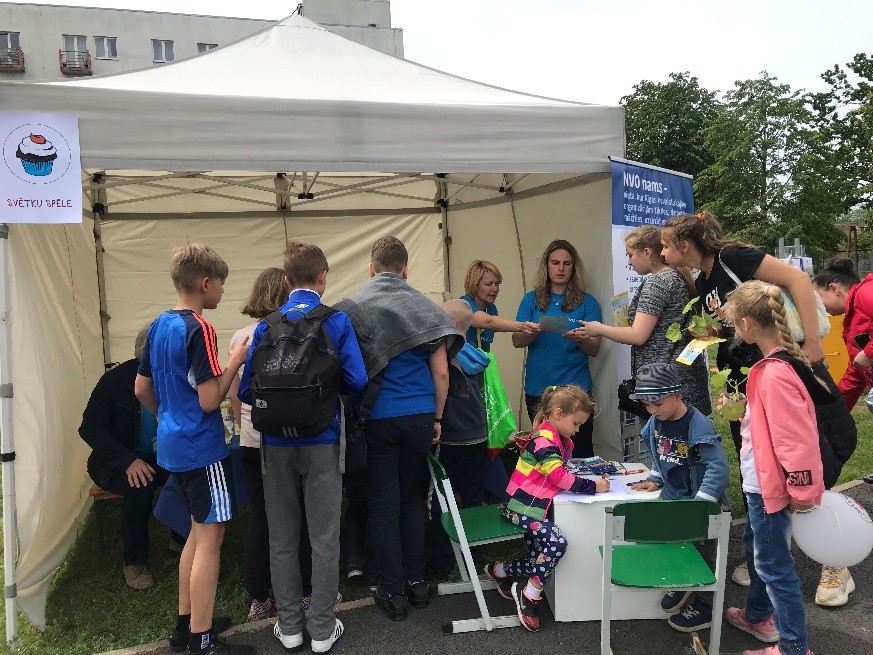
On 13 September 2020, the NGO House continued the successfully launched tradition and, together with NGOs’ representatives, participated in Hospitāļu Street Neighbours’ Festival in another neighbourhood of Riga – in Brasa. This neighbourhood is close to Riga city centre. Hospitāļu Street Neighbours’ Festival has been held in Brasa neighbourhood since 2014, becoming a tradition. The aim of the festivities is to get to know the neighbourhood’s residents, to consolidate residents and bring them joy; the most active residents of Brasa are involved in organising the event. Throughout the day, everyone had the opportunity to take part in various sports activities, educational masterclasses, artistic workshops and scientific experiments as well as enjoy musical performances and delicious food. Planning the event was helped in particular by a representative of the Association of Brasa Neighbourhood who participated at the Siracusa meeting of ACTive NGOs. Using formal and informal moments of exchange, Inese Auziņa found a common language with the representatives of Brighton and Hove, inspiring each other to search for new and creative approaches to event organisation. New ideas coming from that meeting, in turn, encouraged planning the next “public appearance” event of the NGO House in Brasa. During the festival, the NGO House and NGOs met various visitors, both those who know what an NGO is and where the NGO House is located, and those who had not even heard of such organizations before. Linda Ermiča, the manager of the project Hospitāļu Street Neighbours’ Festival 2020 of the association “Brasa”, admits: “Hospitāļu Street Neighbours’ Festival serves as an excellent example of NGOs cooperation opportunities. Visitors were very interested in learning more about the NGO House and in participating in the activities organized by the participating associations. We will also be happy to cooperate with the NGO House in the coming festival and will be happy to see even more NGOs with interesting activities.”
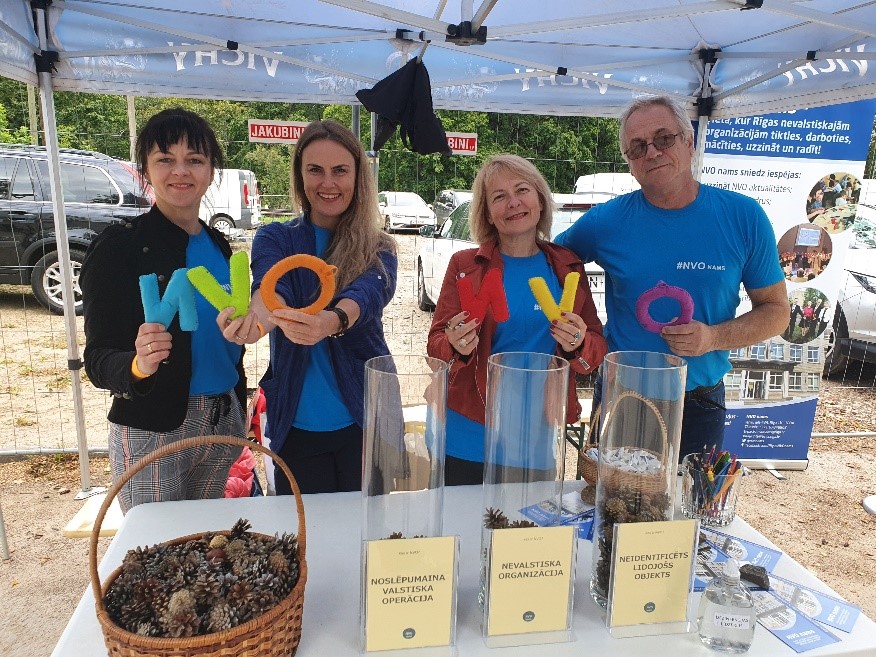
We shall continue filling the vessel of civic synergy
While a new idea – that outdoor events could bring us closer to NGOs – was born in Santa Pola where we met with Brighton’s ULG members, this idea was further reinforced when we met again in Dubrovnik. Outdoor activities, coming closer to residents, meeting with residents in an informal atmosphere, community activities in public outdoor spaces – all these events, by expanding residents’ participation, bring us closer to the NGOs and residents of other neighbourhoods in Riga to develop a constant dialogue because the discussion on NGOs’ cooperation in the city should be continuous. Events outside the premises of the NGO House foster accessibility, it is important to help people and organisations to communicate, it is important to listen to and learn from each other as many residents and organisations have very extensive experience in various fields and they are ready to share their experience with other NGOs and interested parties. NGOs reinforce the mechanism that allows residents to join forces, to not feel lonely, to form alliances. NGOs have a very important role in civil society because these organisations are based on this civic synergy. Activities beyond the walls of the NGO House will help to fill this vessel of synergy; we shall continue our activities, closely interlinked with NGOs in other neighbourhoods of Riga.
As a partner of the URBACT project, Dzintars Koks, the director of the NGO House, explains: “We have not only exchanged good practice with other European cities but have also improved our skills for finding solutions to significant challenges, doing everything possible to promote new forms of collaboration with NGOs. We found new and practical solutions by applying the participatory approach and thanks to URBACT method.”
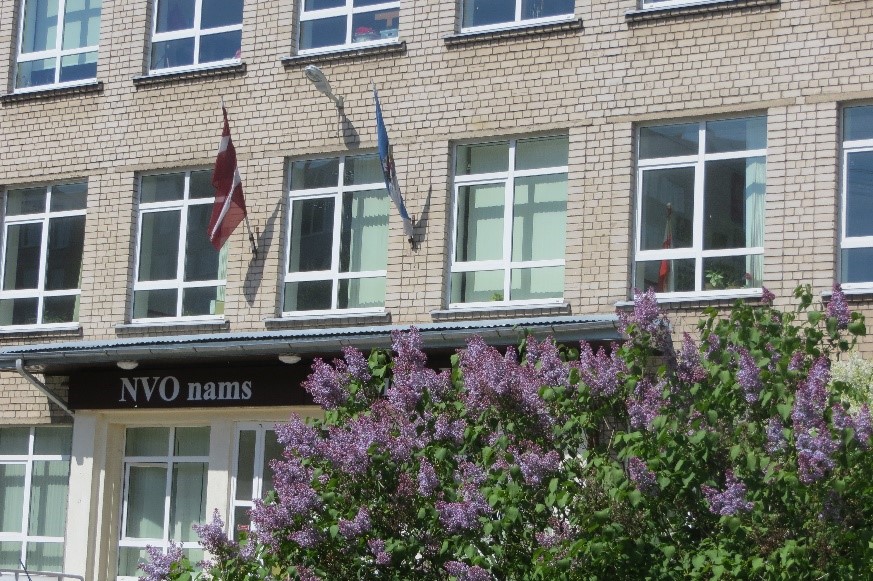
 Submitted by z.biteniece on
Submitted by z.biteniece on
